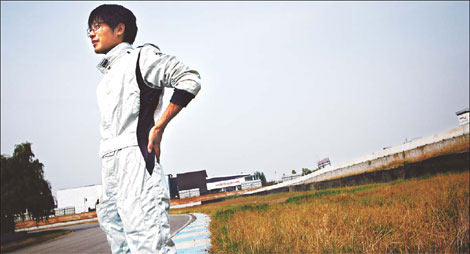
For a decade Han Han has been in the fast lane - as a rally racing driver, a best-selling author and an immensely popular blogger. Zhou Yunzhe / For China Daily
The world's most popular blogger and a rally racing champion, Han Han's controversial image can mask the fact that he is a seriously talented writer, Raymond Zhou offers his appraisal.
In what may prove to be a literary masterpiece, An Ideal City contains a scene in which the male protagonist spots a patch of verdant woods from atop an apartment building, but when he tries to reach it he is blocked by a wall that meanders endlessly. He ends up lost in the mist. Like his character, best-selling author Han Han may have found that the visibility of a wall depends on one's point of view. To make matters more complicated, this wall shifts positions.
Han is a warrior fighting invisible foes that have visible but mundane facades, but his literary works feature clueless characters who have lost their way in a topsy-turvy world. There are few heroes in his fiction, just victims of their time. That message, obviously, has resonated with tens of millions of readers.
Han is the voice of a generation. At 27, he is the most influential person of the 20-something generation in China. He embodies the spirit of the time - an era of constant change and a search for independent identity.
Han began his literary life as the little boy who jumped up and down telling everyone the emperor was not wearing any clothes. The "emperor" in this case was China's educational system. By failing most of the courses and dropping out of high school, Han turned his act of defiance into a debut novel, The Triple Gates, which has sold 2 million copies.
From the beginning, Han spurned conventional narrative for a personal voice. He does not scream like his May 4th Movement predecessors. Instead, he resorts to satire and black humor, which characterize both his fiction and non-fiction. Although he has managed to offend orthodox thinkers, his writing is capable of great subtlety and nuance, which is buried under a thick coating of abrasiveness.
Unfortunately, he says, most of his detractors never bother to read his books. It's also possible his supporters read only a few of his posts, thus stripping him of his complexity in their assessment.
In just one decade, Han has evolved from a straight arrow to a sharp shooter who pretends to be firing indiscriminately - all the while retaining the veneer of unruliness. His targets appear to be the Writers Association, literary figureheads, forced relocation and traffic regulations, but it is what they stand for that he is aiming at.
When he used his experience of being a racing driver to comment on the Hangzhou speed-and-kill accident, the official version that the driver was doing 70 km/hour was exposed as a joke, turning public scrutiny in the direction of possible collusion between traffic police and the wealthy driver, or between power and money.
But there are occasions when Han ventures outside his realm of expertise and falters, such as his criticism of the wildly popular magician Louis Liu (Lu Chen), who he criticized for shilling after the magician's performance at the year-end TV gala. Han deleted his post the next day.
Most of the time, Han is spot on. In the court of public opinion it is usually his opponents who shut up and retreat.
Han has got away with his "antics" partly because he has camouflaged his seriousness with layer upon layer of playfulness. He is like a gadfly, seemingly causing more annoyance than threat to his opponents. In the same vein, his gravitas may have been overlooked by those who see only his rebelliousness. Han is at once oversold and undervalued.
Yet Han's appeal has cut across generational lines. Leung Man-tou, a prominent opinion leader, has compared him with Lu Xun (1881-1936), the most influential critical thinker of modern China.
While his enemies have tried to belittle him by calling him a lightweight, Han has chipped away at the pieces that form the wall yet made it look like a game. His books - novels or essays - reveal how fast he has matured from a self-indulgent teenager with an acerbic tongue to one with a singular voice. With the good looks of a pop idol and the audacity of a rally-driving champion, Han is now virtually a cross between James Dean and J.D. Salinger, with the brusque Lu Xun thrown in.
It appears he is attempting to stop his generation from falling over the cliff, but at this rate he may fall off himself. According to one account, Han receives a daily dose of 5,000 messages that denounce him. He selects the most vicious or intelligent ones and publicizes them as a means to train his willpower. But in person, he remains soft-spoken and mild-mannered. It's hard to detect any fire in him.
A noted literary critic once said: "If I were Han Han's father, I'd slap him crazy."
Will Han dodge the slap and cause the other to fall, or will he fight back in the spirit of the mythical dragon slayer? Whatever response he takes, he will probably downplay his act by saying, "I'm not a rebel at all," because he believes what he advocates is common sense.
